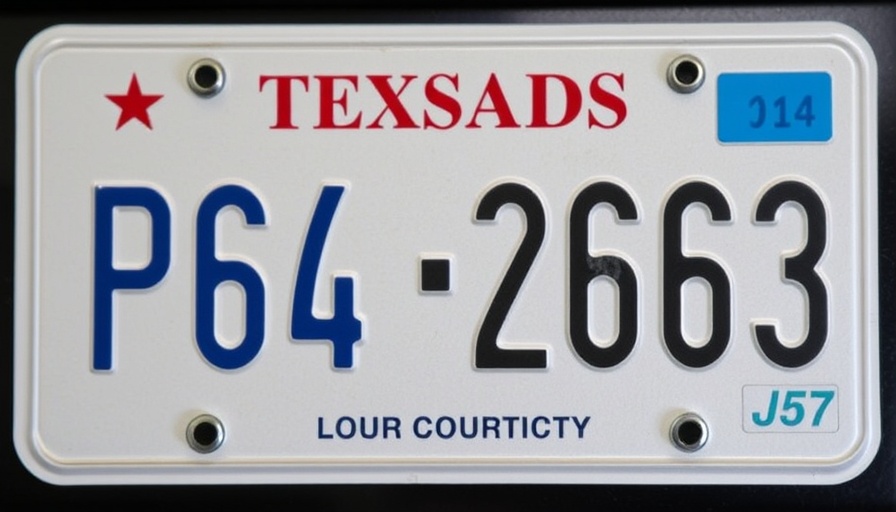
A New Era for Texas Drivers: The Shift from Paper to Metal Tags
As of July 1, Texas will implement a groundbreaking change in its vehicle licensing system, eliminating temporary paper license tags. This transition comes as a crucial response to increasing incidences of fraud linked to the lightweight, easily counterfeitable paper tags, which have previously allowed motorists to evade law enforcement while using falsified documentation.
The Burden of Paper Tags
For years, police departments across Texas have been frustrated by the challenges posed by these paper tags. According to Grand Prairie Police Chief Daniel Scesney, the previous system has led to a "multi-million-dollar black market industry" surrounding fraudulent tags. This has become a public safety issue; the tragic death of Officer Brandon Tsai, who died pursuing a vehicle with a fake tag, underscores the urgency of this legislative change.
Scesney contends that switching to metal temporary plates will significantly reduce fraudulent activities. "Currently, our officers are taking fake paper tags off the street every day. The tag that was on the vehicle he [Tsai] was chasing was scanned on over 200 other vehicles," he noted, painting a vivid picture of the urgency behind the transition.
Law Enforcement's Optimism Amid Concerns
This legislative shift has been met with enthusiasm from law enforcement agencies. The Texas police force views the new metal tags as a "game changer" necessary for enhancing public safety and simplifying enforcement efforts. However, this improvement has also led to questions from the public regarding how the transition will affect their day-to-day lives, especially for those who rely heavily on their vehicles.
What to Expect from Metal Tags
Under the new system, all temporary metal tags will come with enhanced security features, making it nearly impossible to forge. Each tag is equipped with a unique serial number and will be registered directly to the vehicle owner, making tracing and verification easier for law enforcement. However, residents need to prepare for the transition—existing paper tags will no longer be valid after the deadline, and they will need to acquire metal tags promptly to avoid penalties.
Local Implications on the Dallas Community
For residents in Dallas and surrounding areas, this change is particularly salient in terms of public safety and infrastructure accountability. As the city gears up to roll out new initiatives for traffic enforcement, the expectation is that metal tags will streamline the identification of vehicles involved in criminal activity. It may also impact car dealerships and rental services, who need to adapt their practices to accommodate the new tags.
Keeping up with updates from the city council regarding public safety and infrastructure improvements remains crucial as this transition unfolds. Residents should stay informed about how these updates affect local traffic laws and regulations.
The Wider Trend Across the Nation
This move from temporary paper license tags to metal versions isn't unique to Texas. Several other states have begun similar initiatives to address growing concerns around vehicle registration fraud. As cities rethink old paradigms, the trend reflects not only technological advancement but also a concerted effort to bolster public safety in an increasingly automated and digitized age.
Conclusion: Preparing for the Change
As we approach the deadline for switching to metal temporary license tags, Texas residents should take proactive steps to ensure compliance with the new regulations. It's crucial to be aware of the changes and understanding the benefits—reduced fraud, enhanced safety measures, and easier identification—associated with the new metal tags.
Embrace this opportunity for change, as it promises a safer driving environment across Texas. Stay tuned to local news for updates on how these changes may affect your community in Dallas.
 Add Element
Add Element  Add Row
Add Row 



 Add Row
Add Row  Add
Add 


Write A Comment